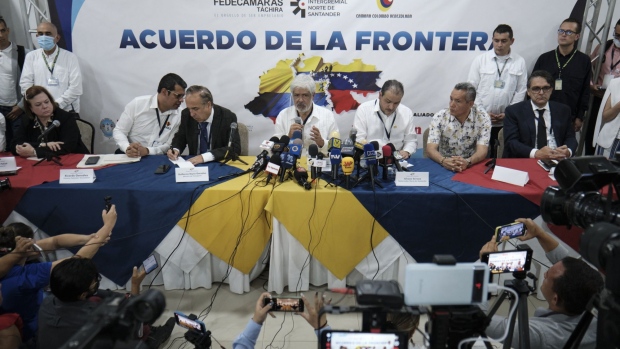Aug 25, 2022
Border Reopening Stalls as Maduro Mulls Impact of Colombia Trade
, Bloomberg News

(Bloomberg) -- Gustavo Petro’s inauguration as Colombia’s first leftist president was expected to quickly lead to the reopening of the border with Venezuela, marking a reboot of relations between the countries after years of acrimony.
Politicians prepared ceremonies at border towns and business owners stockpiled goods, anticipating trade would resume in the days after Petro took office. Yet, more than two weeks later, the reopening of the border has stalled.
Venezuela President Nicolas Maduro has slowed the process due to concerns about the impact of a flood of Colombian goods on his country’s nascent economic recovery and questions over how to unwind current trade relationships, according to people with knowledge of the process. For years, Maduro has turned to political allies, like Iran and Turkey, for imports, striking deals that often benefited top military officers at the ports and border checkpoints.
The system of illicit trade at the border -- which is overrun by contraband and largely controlled by gangs -- is proving difficult to unravel, the people said.
“I worry when I hear people say they want to strengthen both nations’ current commercial relationship, because sadly those are informal relationships,” said Tiziana Polesel, the head of Venezuela’s commerce chamber Consecomercio, in an interview from Cucuta. “What we want is to rebuild formal relationships, with equal conditions for all, without kickbacks.”
Last year, Colombia exported just $331 million of goods to Venezuela, down from $6.1 billion in 2008. The countries severed diplomatic ties in 2019. But Petro, who took office on Aug. 7, has pledged to re-establish relations and reopen the border, without publicly specifying a date. Business groups on both sides forecast trade could reach $1.2 billion by year’s end if cross-border commerce resumes.
The lack of progress at the border is the most salient example of how Petro and Maduro have struggled to meet the expectations of politicians and business owners that the countries would quickly restore ties. Petro, who has praised Maduro’s predecessor Hugo Chavez, has appeared reticent to fully embrace Venezuela, at least in the early days of his administration.
After a senior figure in Venezuela’s ruling Socialist party called for Colombia’s new government to send back “murderers” and “thieves” who have taken refuge there, Petro responded Monday night by saying he wouldn’t extradite Venezuelan political dissidents.
Neither a Petro spokesperson nor Venezuela’s Foreign Ministry responded to messages seeking comment.
Read more: Petro Upends Colombia Diplomacy by Reaching out to Venezuela
Last week, Colombian politicians and business owners gathered inside a packed ballroom in Cucuta, the country’s most important commercial crossing with Venezuela, hoping to hasten an official opening.
Yet, the preemptively labeled “border agreement” event produced no binding deal. While the newly-appointed Venezuelan ambassador to Colombia, Felix Plasencia, and the governor of the border state Tachira, Freddy Bernal, were initially on the agenda, neither attended the event.
Neither responded to requests for comment.
Maduro’s representatives, meanwhile, have been meeting with food and pharmaceutical executives, who fear the influx of cheaper Colombian products could kill the respite they’ve experienced during a recent economic uptick, according to people with direct knowledge of the talks.
“The expectation has to be managed with caution. It’s not so simple. It’s a border where many things have happened,” said Carlos Fernandez, president of Venezuelan business chamber, Fedecamaras, in a phone interview. “The Venezuelan economy is not the same, it’s smaller. The Venezuelan consumer is different. The capacity for imports has been greatly reduced.”
Speaking about the reopening on state TV Tuesday, Maduro said, “We are preparing ourselves so that the plan is solid.”
Colombia’s newly-appointed Commerce Minister German Umana told a buzzing room at the event of about 200 attendees that talks to restart trade with Venezuela were “fruitful and advanced.” Attendees traded business cards and munched on deep-fried chickpea pies and cheese sticks, delicacies representative of both nations.
Later, Transportation Minister Guillermo Reyes corralled reporters to the Tienditas International Bridge to assure them the passages to Venezuela were ready for use despite still being blocked by containers and scaffolding.
Less than a hundred feet from the bridge sits one of approximately 50 irregular border crossings -- winding paths cleared through the bush and crossing shallow rivers. About 17 of the so-called trochas are in Cucuta and are so well known they are referred to by name, such as La Playita. Houses have been spray painted to mark the control of Colombian rebel group ELN and to send warnings to its rival, the Venezuelan criminal group known as Tren de Aragua.
Men, women and children carry sacks of corn flour, toilet paper, and rolled steel panels toward Venezuela. Using a wagon, one man dragged the front frame of a small car into Colombia.
“Once the border was closed, illegality took over and contraband began to cross the border with the help of authorities,” said Sandra Guzman, an agent at one of the five remaining customs offices in Cucuta, down from about 60 a decade ago. “Those were our operations that were lost, as well as our jobs.”
Now, locals like Carolina Moros see an opportunity in Petro’s promise to make amends with Maduro and reopen trade with Venezuela.
“It would finally give us some oxygen,” she said from inside the cleaning products factory she helped build inside a low-tax manufacturing zone meant to encourage trade with Venezuela, which is just four miles away.
Instead, boxes of detergent and bleach have piled up inside CosmoGreen’s cavernous warehouse. Large vats meant to hold liquids that can shine floors and remove stains from dress shirts sit empty and the room below where 24 workers once siphoned them into bottles is dark and quiet.
“We never thought it would take this long for the border to reopen,” Moros said. “Never.”
©2022 Bloomberg L.P.








